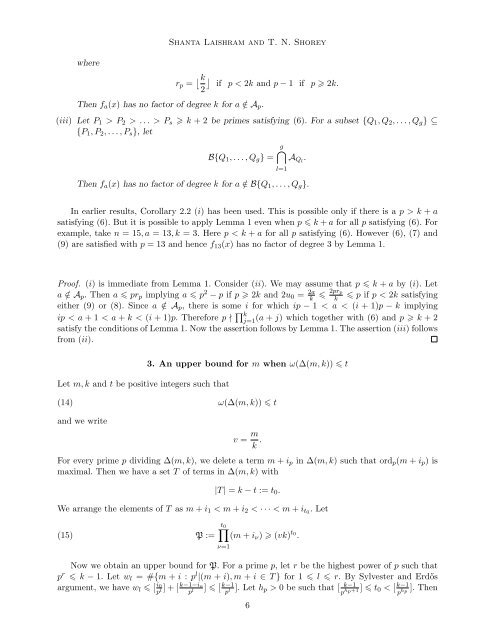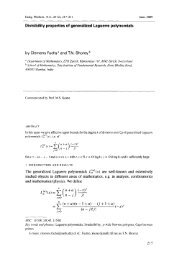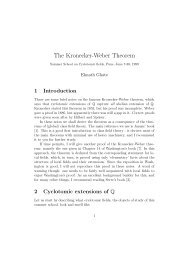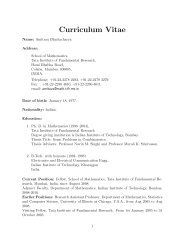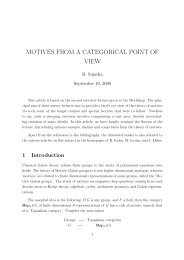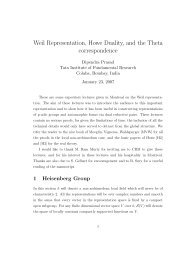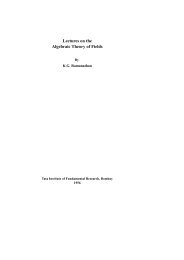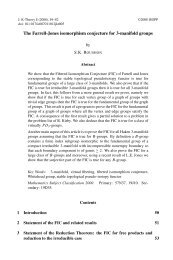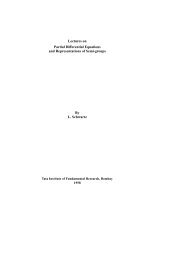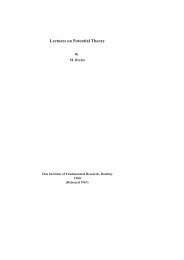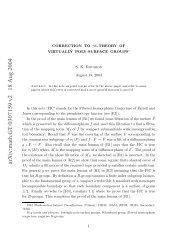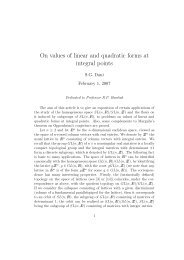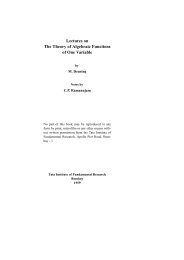Extensions of Schur's irreducibility results - Tata Institute of ...
Extensions of Schur's irreducibility results - Tata Institute of ...
Extensions of Schur's irreducibility results - Tata Institute of ...
Create successful ePaper yourself
Turn your PDF publications into a flip-book with our unique Google optimized e-Paper software.
whereShanta Laishram and T. N. Shoreyr p = ⌊ k ⌋if p < 2k and p − 1 if p 2k.2Then f a (x) has no factor <strong>of</strong> degree k for a /∈ A p .(iii) Let P 1 > P 2 > . . . > P s k + 2 be primes satisfying (6). For a subset {Q 1 , Q 2 , . . . , Q g } ⊆{P 1 , P 2 , . . . , P s }, letB{Q 1 , . . . , Q g } =g⋂A Ql .Then f a (x) has no factor <strong>of</strong> degree k for a /∈ B{Q 1 , . . . , Q g }.l=1In earlier <strong>results</strong>, Corollary 2.2 (i) has been used. This is possible only if there is a p > k + asatisfying (6). But it is possible to apply Lemma 1 even when p k + a for all p satisfying (6). Forexample, take n = 15, a = 13, k = 3. Here p < k + a for all p satisfying (6). However (6), (7) and(9) are satisfied with p = 13 and hence f 13 (x) has no factor <strong>of</strong> degree 3 by Lemma 1.Pro<strong>of</strong>. (i) is immediate from Lemma 1. Consider (ii). We may assume that p k + a by (i). Leta /∈ A p . Then a pr p implying a p 2 − p if p 2k and 2u 0 = 2a k 2prpk p if p < 2k satisfyingeither (9) or (8). Since a /∈ A p , there is some i for which ip − 1 < a < (i + 1)p − k implyingip < a + 1 < a + k < (i + 1)p. Therefore p ∤ ∏ kj=1(a + j) which together with (6) and p k + 2satisfy the conditions <strong>of</strong> Lemma 1. Now the assertion follows by Lemma 1. The assertion (iii) followsfrom (ii).Let m, k and t be positive integers such that3. An upper bound for m when ω(∆(m, k)) t(14)ω(∆(m, k)) tand we writev = m k .For every prime p dividing ∆(m, k), we delete a term m + i p in ∆(m, k) such that ord p (m + i p ) ismaximal. Then we have a set T <strong>of</strong> terms in ∆(m, k) with|T | = k − t := t 0 .We arrange the elements <strong>of</strong> T as m + i 1 < m + i 2 < · · · < m + i t0 . Let(15)P :=t 0 ∏ν=1(m + i ν ) (vk) t 0.Now we obtain an upper bound for P. For a prime p, let r be the highest power <strong>of</strong> p such thatp r k − 1. Let w l = #{m + i : p l |(m + i), m + i ∈ T } for 1 l r. By Sylvester and Erdősargument, we have w l [ i 0p l ] + [ k−1−io ] [ k−1 ]. Let hp l p lp > 0 be such that [ k−1 ] tp hp+1 0 < [ k−1 hp ]. Thenp6


